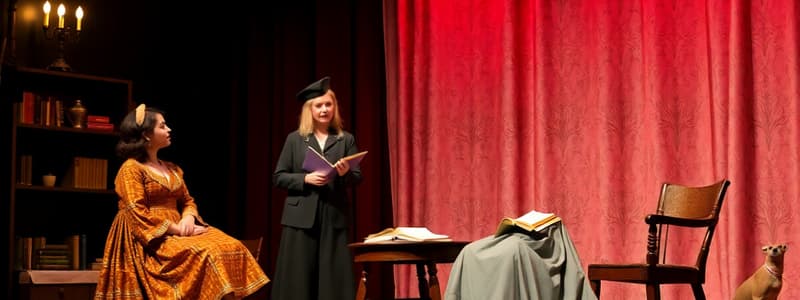Podcast
Questions and Answers
What is the term for the event that initiates the story and sets the plot in motion?
What is the term for the event that initiates the story and sets the plot in motion?
- Falling action
- Initial incident (correct)
- Denouement
- Climax
Which stage of a plot structure comes after the climax?
Which stage of a plot structure comes after the climax?
- Denouement
- Rising action
- Initial incident
- Falling action (correct)
What term describes the internal or external struggle that creates dramatic tension?
What term describes the internal or external struggle that creates dramatic tension?
- Soliloquy
- Resolution
- Diction
- Conflict (correct)
Which element refers to the dramatic device that allows a character to express thoughts while alone on stage?
Which element refers to the dramatic device that allows a character to express thoughts while alone on stage?
What is the primary function of costumes in a dramatic production?
What is the primary function of costumes in a dramatic production?
Which of the following performance elements involves the way an actor conveys emotional character through their voice?
Which of the following performance elements involves the way an actor conveys emotional character through their voice?
What stage in a plot structure serves as the resolution or conclusion to the story?
What stage in a plot structure serves as the resolution or conclusion to the story?
Which element refers to the use of lighting in a performance?
Which element refers to the use of lighting in a performance?
What is the term for the pronounced clarity and selection of words in a performance?
What is the term for the pronounced clarity and selection of words in a performance?
Which performance element utilizes movements of the body to convey meaning?
Which performance element utilizes movements of the body to convey meaning?
Which of the following elements is NOT traditionally considered a literary element of theatre?
Which of the following elements is NOT traditionally considered a literary element of theatre?
What does the theme of a play specifically refer to?
What does the theme of a play specifically refer to?
Which of the following is an example of a genre in theatre?
Which of the following is an example of a genre in theatre?
According to Aristotle, what is essential for advancing the action of the play?
According to Aristotle, what is essential for advancing the action of the play?
What term refers to the techniques and methods used by playwrights and directors in theatre?
What term refers to the techniques and methods used by playwrights and directors in theatre?
Which element of theatre might be considered the most important by many playwrights and actors?
Which element of theatre might be considered the most important by many playwrights and actors?
What is the primary function of dialogue in a play?
What is the primary function of dialogue in a play?
Which of the following aspects is NOT considered part of spectacle in theatre?
Which of the following aspects is NOT considered part of spectacle in theatre?
Study Notes
Theatre Production Elements
- Theatre elements are used to analyze and evaluate theatre artworks, categorized into Literary, Technical, and Performance elements.
Literary Elements
- Aristotle defined six essential elements of good drama:
- Plot: The action and storyline of the play.
- Theme: The main idea or lesson learned from the play.
- Characters: The people, animals, or ideas portrayed.
- Dialogue: The words spoken by the characters.
- Music/Rhythm: Includes the rhythm of the actor's voices.
- Spectacle: The visual aspects of the play.
- Modern theatre adds these elements:
- Characters, Plot, Theme, Dialogue: Remain essential.
- Convention: Techniques and methods used to create a style.
- Genre: Type of play (e.g., comedy, tragedy).
- Audience: The viewers and listeners.
- Other literary elements include:
- Plot structure: Initial incident, preliminary event, rising action, climax, falling action, denouement, exposition.
- Conflict: Internal or external struggles causing dramatic tension and suspense.
- Language (Diction, Style): Specific manner of expression, verbal style.
- Soliloquy: A speech by a single actor alone on stage.
- Monologue: A long speech by one actor.
Technical Elements (Design or Visual Elements)
- Scenery (Set): Equipment like curtains, flats, backdrops, for environment and mood.
- Costumes: Clothing and accessories for character and time period.
- Props: Moveable objects on stage (not costumes or scenery).
- Lights: Placement, intensity, and color to create environment and mood.
- Sound: Effects to communicate character, context, or environment.
- Makeup: Used to transform actors into characters.
Performance Elements
- Acting: Utilizing face, body, and voice to portray character.
- Character Motivation: Reason(s) for character behavior.
- Character Analysis: Examining the use of literary, technical, and performance elements.
- Empathy: Relating to another's feelings.
- Speaking: Mode of expression or delivery of lines.
- Breath Control: Efficient use of lungs and diaphragm for speaking.
- Vocal Expression: How voice conveys character.
- Inflection: Changes in voice pitch or loudness.
- Projection: How voice carries to the audience.
- Style: Fundamental element in performance, mode of delivery.
- Diction: Selection and pronunciation of words; clarity of speech.
- Nonverbal Expression (Gestures): Head, shoulder, arm, hand, leg, or foot movements.
- Facial Expressions: conveying moods and personality.
- Physical and Vocal Aspects: Actors use to convey mood, feeling, and personality.
Studying That Suits You
Use AI to generate personalized quizzes and flashcards to suit your learning preferences.




